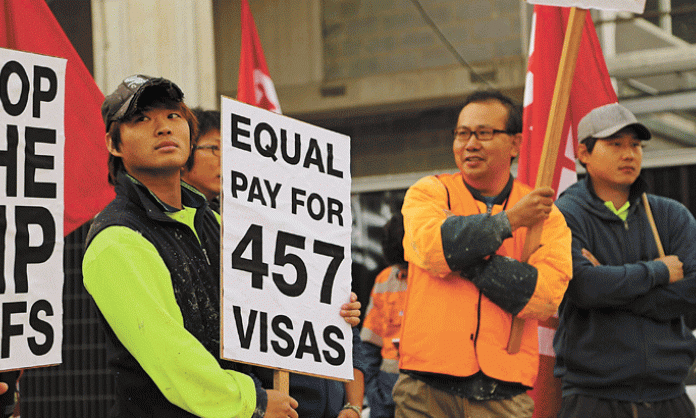In the first week of June, Fairfax newspapers exposed the ruthless exploitation of workers on employer-sponsored working visas. Hundreds of workers from India and the Philippines paid recruitment agents between $5,000 and $40,000. Some workers were required to pay 48 percent interest rates on their loans.
Others found they had little or no work when they reached Australia. Some Filipino workers signed contracts saying they could be sacked for trade union activities or for falling sick.
The Fairfax stories coincide with a push from the Labor government to tighten the operation of the 457 visa scheme. However, Labor’s changes to the scheme don’t attack the fundamental problem of these visas. Workers are vulnerable to gross exploitation because if they fall out with their boss they are liable to the sack and deportation.
One positive in Labor’s reforms is that if a worker quits or is sacked they will have up to 90 days (up from 28 days) to find a new employer to sponsor them.
However, workers still face deportation unless they can find a new employer – in a foreign country, with a declining labour market, and with no access to welfare or job placement services. The worker could still have a massive debt to pay, and most likely a poor reference from their original employer. Labor’s approach leaves the fundamental problem with these visas untouched: the fact that the workers’ visa relies on the whim of their boss.
Other proposed changes will do even less to reduce exploitation of workers. Three hundred overworked “Fair Work” inspectors do little to police Australia’s workplaces. Expecting them to police employer compliance with visa conditions won’t achieve much. There is no protection for worker-whistleblowers in Labor’s changes. And the private sale of “recruitment services” – a key part of the exploitation of many migrant workers – will remain untouched.
One of the changes trumpeted by Labor is the re-introduction of “labour market testing” for employers wishing to sponsor some 457 visa holders. Socialists oppose this approach. It is divisive, providing fuel to the widespread myth that blames migrants for unemployment.
Similar schemes around the world require employers to attest that there is no local worker willing to fill the job. But these “controls” are routinely flouted, and make no difference to the way such visas are used to trash workers’ rights.
The 457 scheme has an identical structure to “guest labour” schemes in the US, Canada and elsewhere. Businesses become the gatekeepers, sponsoring individual workers across the border. All of these schemes claim extensive protections for workers. And yet, because the structure of the schemes tie workers to their boss on pain of deportation, gross exploitation is endemic.
In the US, the Southern Poverty Law Center has run hundreds of legal cases on behalf of guest workers. They argue: “Under the guest worker program, workers facing exploitation generally must either continue working for the employer that brought them to the US or return home. Because they often are left deeply in debt from exorbitant recruiting fees, they typically have little choice but to remain on the job.”
Many migrant, left and liberal groups in the US call for the scrapping of guest worker schemes, along with other repressive measures directed at migrants.
In May this year, the Victorian State Council of the Australian Manufacturing Workers Union approved a resolution to: “…include all current 457 visa holders in our organising and recruitment strategies and begin a political campaign with those workers and our members for all temporary workers to be given optional permanent residency status. This is to remove the fear factor of being sent home – a situation that bosses rely on in order to exploit a compliant workforce. We will oppose 457 visa workers being deported when government policy changes, companies close, jobs end or if the workers get sacked. We reject any form of 457 visa or any other employer-initiated migration scheme and demand that all work migration be on a permanent residency basis.”
A real campaign along these lines would do a thousand times more for workers’ rights than Labor’s posturing.











